- News
ULS establishes alliance with municipalities of the Coquimbo Region to strengthen initial teacher training
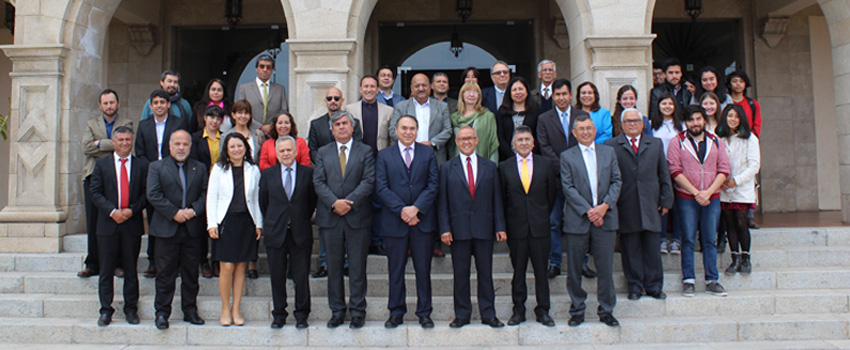
La Higuera, Salamanca, Vicuña and Río Hurtado will be the communes that will work together with the university to promote and enhance the quality training of educational professionals.
In the search to achieve an improvement in the initial training of education professionals and benefit the student communities, the University of La Serena established a recent collaboration agreement with the municipalities of the communes of La Higuera, Salamanca, Vicuña and Río Hurtado, through their respective educational departments.
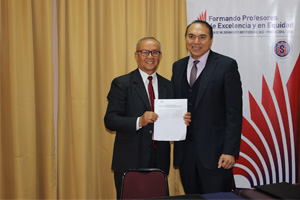 The signing took place in the headquarters of the institution, on which occasion the Rector of the ULS, Dr. Nibaldo Avilés, participated, together with the councilors Gary Valenzuela (Río Hurtado) and Rafael Vera (Vicuña), and the representatives from the municipal education departments, Pablo Larrondo (La Higuera) and Claudio Oyarzún (Salamanca).
The signing took place in the headquarters of the institution, on which occasion the Rector of the ULS, Dr. Nibaldo Avilés, participated, together with the councilors Gary Valenzuela (Río Hurtado) and Rafael Vera (Vicuña), and the representatives from the municipal education departments, Pablo Larrondo (La Higuera) and Claudio Oyarzún (Salamanca).
“This is an agreement that is part of a University project that aims to strengthen the initial training of teachers, and this requires that we begin to work where it is really needed, which are the schools, mainly through the municipalities. And this agreement gives us a tremendous opportunity as an institution to be able to carry out this important work. This project, without a doubt, will have a positive impact on our young people and children, as well as on the teachers of the establishments in these communities and the future teachers trained in our school,” emphasized the Rector, Dr. Avilés.
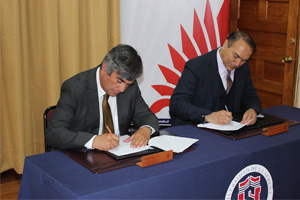 This agreement is added to the one already established last May with the municipality of Coquimbo, which considers the development of mutual collaboration actions that benefit students and teachers of the educational establishments that manage the DAEM of each commune, as well as the development of skills generic and professional of the students of the eleven pedagogy courses taught by the institution.
This agreement is added to the one already established last May with the municipality of Coquimbo, which considers the development of mutual collaboration actions that benefit students and teachers of the educational establishments that manage the DAEM of each commune, as well as the development of skills generic and professional of the students of the eleven pedagogy courses taught by the institution.
The responsibility acquired with this new alliance, both by the authorities of the ULS and by the councilors and representatives of the DAEM, undoubtedly reflect the commitment to contribute with quality training that is linked to the requirements of local communities.
“This agreement means an enormous benefit for our commune, especially for our students, who pursue their education in the different establishments of the commune (…). This alliance presents us with a unique opportunity to show our students other realities so that they can expand their borders and access new knowledge alternatives,” said the mayor of Río Hurtado, Gary Valenzuela.
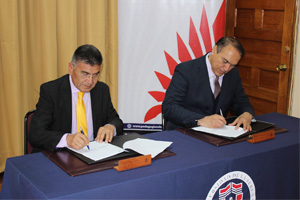 For his part, the mayor of Vicuña, Rafael Vera, pointed out that “we are demonstrating that different State institutions can work together to achieve the same objective, which is quality education and thus generate the conditions so that young people can have a “a real opportunity to reduce the inequality gaps that exist in our country and that are linked to education.”
For his part, the mayor of Vicuña, Rafael Vera, pointed out that “we are demonstrating that different State institutions can work together to achieve the same objective, which is quality education and thus generate the conditions so that young people can have a “a real opportunity to reduce the inequality gaps that exist in our country and that are linked to education.”
The representative of the La Higuera commune, Pablo Larrondo, stated in the same way, who referred to providing equal opportunities to his students. Finally, the Director of the DAEM of Salamanca, Claudio Oyarzún, expressed that “the challenge that this agreement gives us is an opportunity to achieve a relationship of quality and equity, and thus reduce the gaps through teacher training.”
It should be remembered that the agreement is part of the actions developed by the PMI FIP ULS1501 Institutional Improvement Plan, through the subunit of “Linkage with Educational Communities and Training of Practices in Work Contexts” led by the academic, Mg. Sandra Alvarez.
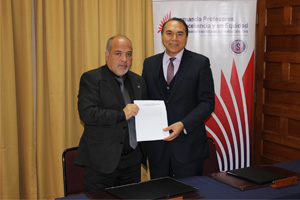 Key aspects of the agreement
Key aspects of the agreement
The alliance considers designing strategies and activities that generate opportunities to share pedagogical knowledge and experiences obtained in the classroom teacher's educational practices; will allow the use of the infrastructure of both the respective educational establishments and the institution; will contemplate the generation of procedures to promote the development of applied pedagogical research; and the implementation of programs and methodologies for the development of educational innovation through ICT practices.
It also aims to manage an efficient system of pedagogical practices in work contexts, and the establishment of the design and coordination of the efficient development of actions aimed at achieving higher and better rates of attraction of students in the school system with pedagogical talents, among other aspects.
Source: PMI FIP ULS1501
